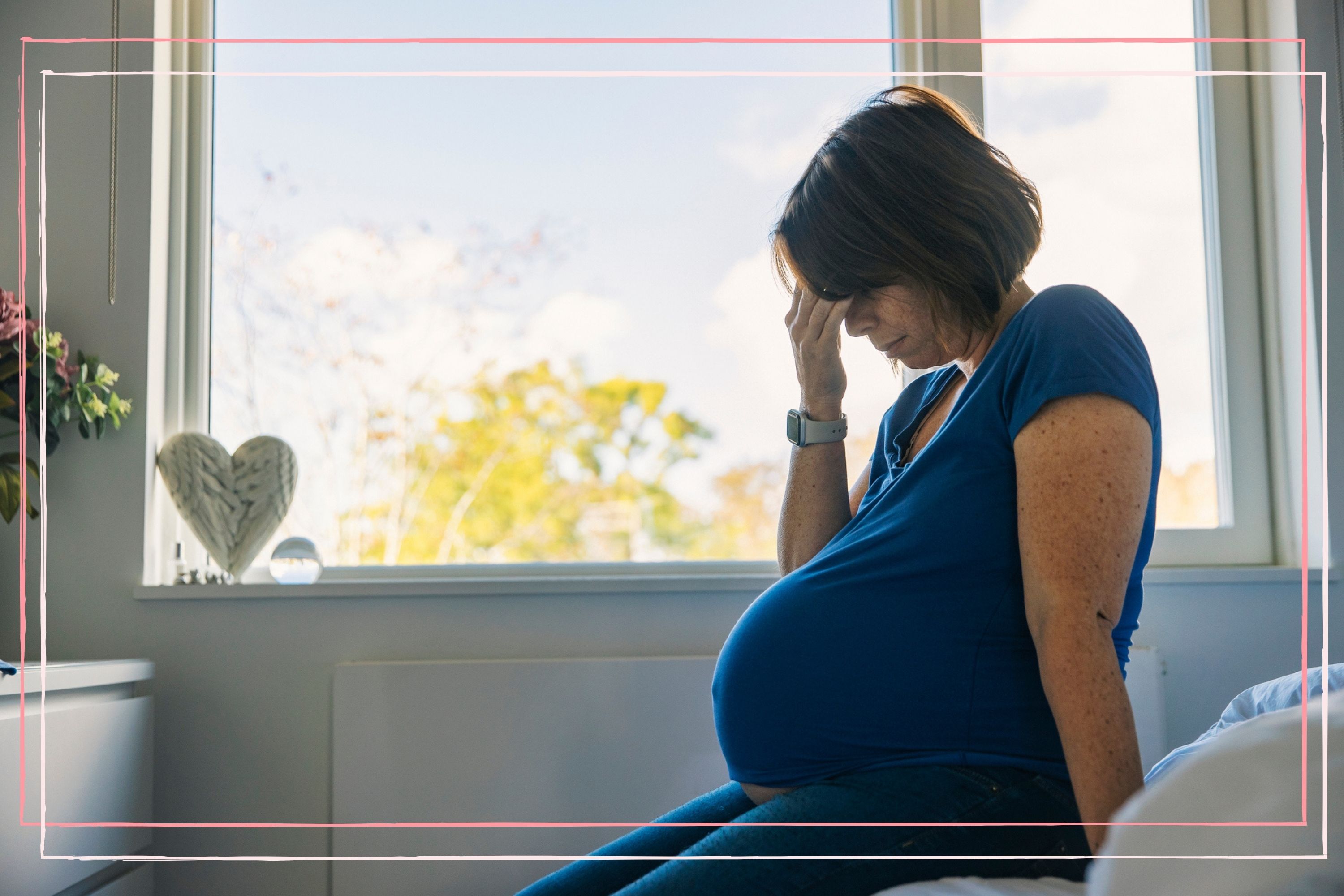What triggers pregnancy migraines, what to do and when to see a doctor
Understanding and managing pregnancy migraines is essential for the health and comfort of expectant mums. Here, two doctors share their advice.


Pregnancy migraines are amongst the many symptoms that expectant mothers might experience from the first trimester.
Like many pregnancy symptoms, migraines can be triggered by the hormonal fluctuations that come with being pregnant. Dr Shazia Malik, a Consultant Obstetrician and Gynaecologist at The Portland Hospital told GoodToKnow, "Pregnancy is a time of significant change for any woman, bringing about a myriad of physical and emotional adjustments. Among these changes, migraines can be a common concern, affecting a considerable number of expectant mothers. Understanding migraines during pregnancy is crucial for managing them effectively" as well as ensuring both your and your baby’s wellbeing.
As well as Dr Malik, we also consulted highly experienced GP Dr Semiya Aziz for this article, and the two doctors shared their advice with us on pregnancy migraines, including what you can do about them at home and when you should speak to your doctor.
The information in this article is for general purposes only and does not take the place of medical advice. It is essential to be guided by your GP and take note of official NHS advice. You should immediately seek medical attention if you think you are having a migraine while you are pregnant, symptoms worsen or you are concerned about any element of your pregnancy. If you are unsure or concerned about any of your symptoms during pregnancy then it is crucial to seek personalised advice from a doctor as soon as possible.
Are pregnancy migraines common and how do they differ from headaches?
"It is not uncommon to get migraine attacks during pregnancy. In fact, 15 to 20% of women will get migraines during pregnancy," Dr Aziz told us. "Migraine can occur any time during the pregnancy and are primarily governed by hormonal imbalances."
Dr Malik explained, "migraines are relatively common during pregnancy, particularly in the first and third trimesters. Hormonal fluctuations play a significant role in this prevalence, affecting migraine frequency and severity.
"Interestingly, many women with a history of migraines may find that the higher hormone levels in the 2nd and 3rd trimester, and stable oestrogen levels during breastfeeding can actually reduce the frequency of their migraines."
Parenting advice, hot topics, best buys and family finance tips delivered straight to your inbox.
Charity The Migraine Trust adds to this, "not everyone will see an improvement in their migraine, especially in the early weeks of pregnancy. For some women, their migraine is unaffected. Some women experience worsening migraine during pregnancy although this is rare."
In regards to the differences between pregnancy migraines and pregnancy headaches Dr Malik explains, "While headaches and migraines are both types of head pain, migraines are usually more severe and can be accompanied by other symptoms such as nausea, visual symptoms, sickness, and sensitivity to light and sound. Headaches tend to be less severe and more localised.
"Migraine headaches are a common type of headache in pregnancy. These painful, throbbing headaches are usually felt on one side of the head and result from expansion of the blood vessels in the brain. This is sometimes accompanied by nausea, vomiting, and sensitivity to light."
If you think you are having a migraine for the first time while you are pregnant it is important to speak to your GP as soon as possible.
Pregnancy research charity Tommy’s advises, "Talk to your GP or midwife if you’ve had migraines before and if you are taking or have taken any medication for them. This is because some migraine medications can contain codeine, aspirin or ibuprofen, which are not recommended in pregnancy.
"Don’t wait until you have a migraine to speak to someone about them. Your doctor should be able to give you advice on how you can manage your symptoms while you’re pregnant, and if you choose to breastfeed."
What triggers migraines during pregnancy and why can they be so bad?
Migraines during pregnancy can be triggered by various factors, including hormonal changes, stress, dehydration, and lack of sleep.
"Migraine attacks during pregnancy are most commonly triggered by hormonal changes however, like anyone suffering with migraine, other conditions such as stress, fatigue, certain foods, or lack of food, sensory stimuli, or even lack of sleep, can precipitate a migraine attack," says Dr Aziz.
Dr Malik explains, "These migraines can be particularly severe due to the body's heightened sensitivity to changes and the limited options for safe medication during pregnancy."
Dr Malik adds, "Suddenly stopping caffeinated drinks can be a trigger in the first trimester (although your body should quickly adjust), and it can be helpful to reduce caffeine intake in the few months before a planned pregnancy to avoid this. Your circulation doubles in pregnancy, so increasing your water intake is important – dehydration can trigger headaches and cause excess fatigue. If you experience nausea and vomiting in the first trimester, do get medication from your doctor as dehydration and hypoglycaemia can exacerbate headaches/migraines. Sinusitis can also trigger headaches – it’s common to feel more nasally congested in pregnancy due to hormonal changes. Treating hayfever and allergies is also helpful – there are safe medications you can take after discussion with your doctor."
Can pregnancy migraines be prevented and how do you treat them?
"Unfortunately, we have a little control over our hormones during pregnancy. However, we can control certain factors such as managing stress, staying hydrated, maintaining a regular sleep schedule and avoiding trigger foods," Dr Aziz says. "Relaxation techniques as well as cold ice packs may be of some benefit."
Dr Malik agrees that while pregnancy migraines can’t be prevented, lifestyle choices can have an effect on the frequency and severity of migraines: "While it may not be possible to completely prevent migraines during pregnancy, certain strategies can help reduce their frequency and severity. These include maintaining a consistent sleep schedule, staying well hydrated, managing stress through relaxation techniques, and avoiding known migraine triggers. Taking treatment for nausea and vomiting can be helpful both for symptom control and preventing migraines."
In regards to pain relief, it is very important to be guided by your doctor and seek personalised medical advice regarding what may be safe pain relief for you during pregnancy.
Dr Aziz says, "It is important to optimise all the necessary lifestyle measures to avoid the triggers for a migraine in the first place," and emphasises that any type of pain relief should be discussed with your healthcare professional before you take it.
"The options for migraine medication are limited during pregnancy due to safety concerns," Dr Malik states. "Paracetamol is generally considered safe but should be used under the guidance of a healthcare professional. Non-pharmacological approaches, such as cold compresses, rest in a dark room, and gentle exercise, can also be beneficial.
"For more frequent or troublesome migraines it is best to see a specialist, especially if you need additional medication." You should also speak to your GP if you think you are having a migraine for the first time whilst pregnant.
Speaking to a doctor about pregnancy migraines
In general, if you are concerned about the onset of migraines during pregnancy, if symptoms are particularly bad or you are concerned about anything, then you should speak to your GP or healthcare provider as soon as possible. Charity The Migraine Trust advise, "If you do think you are having migraine for the first time while you are pregnant it is important to visit your GP so the causes for your headache can be checked and treated if necessary."
"Migraine attacks during pregnancy are not usually a sign of any complications," Dr Aziz reassures, but she adds, "if symptoms such as visual disturbances or high blood pressure occurs, it is essential to urgently see your healthcare professional." Dr Aziz also says, "If the migraine results in a debilitating, headache, generalised weakness, visual disturbances and high blood pressure, it is important to be seen urgently for an assessment."
Dr Malik warns, "if migraines are accompanied by unusual symptoms such as visual disturbances, severe pain, or symptoms suggestive of pre-eclampsia (like high blood pressure and protein in the urine), it's important to seek medical attention. These could be signs of pregnancy complications. Again, it is always best to speak to a professional who can provide advice and tests, if required."
The NHS states: "A headache can sometimes be a symptom of pre-eclampsia, which can lead to serious complications if it's not monitored and treated. Pre-eclampsia usually starts after 20 weeks of pregnancy."
The NHS advises that you should ask for an urgent GP appointment or get help from NHS 111 immediately if you have:
- a migraine and you're pregnant or just had a baby
- a migraine and it's lasted longer than 72 hours
- a migraine and aura symptoms last longer than an hour at a time
- a severe headache
- problems with vision, such as blurring or seeing flashing lights
- pain just below your ribs
- vomiting
- a sudden increase in swelling of your face, hands, feet or ankles
Call 999 if you or your child:
- have a headache that came on suddenly and is extremely painful
- have problems speaking or remembering things
- lose your vision or have blurred or double vision
- feel drowsy or confused
- have a seizure or fit
- have a very high temperature and symptoms of meningitis
- cannot move or have weakness in the arms or legs on 1 side of your body, or 1 side of your face
Doctors answer some frequently asked questions about pregnancy migraines
Is it OK to sleep with a migraine during pregnancy?
Both Dr Malik and Dr Aziz answered that yes, it is generally safe to say that pregnant women can sleep with a migraine. However Dr Aziz advises, "if there are additional new concerning symptoms, then it is important to seek advice from health care professional" and Dr Malik says, "sleeping with a migraine is generally safe and can help alleviate symptoms. Although it is important to note that you should speak to a medical professional if you are concerned about the onset of migraines during pregnancy or if symptoms are particularly bad."
What sleeping position is best to ease a migraine during pregnancy?
"There is no specific sleeping position that can reduce a migraine," says Dr Aziz. "Although there are some suggestions that sleeping on your side with your head elevated may ease the migraine."
What not to do after a pregnancy related migraine
"After experiencing a migraine, avoid jumping back into stressful or physically demanding activities. Give your body time to recover and avoid known migraine triggers," says Dr Malik.
"It is important to avoid any triggers for a migraine, such as avoiding bright lights and noises," advises Dr Aziz. "Activities such as adequate rest, staying well hydrated, eating well and sleeping well can help to prevent a migraine attack."
What is the difference between a headache and a migraine?
Dr Aziz explains: "A headache can be a symptom of a migraine and can have many different causes. A migraine on the other hand is defined as a neurological disorder."
The information on GoodTo.com does not constitute medical or other health advice or diagnosis and should not be used as such. Although GoodtoKnow consults medical experts to create and fact-check content, this information is for general purposes only and does not take the place of medical advice. Always seek the guidance of a qualified health professional or seek urgent medical attention if needed.
Our experts

Dr Shazia Malik is a Consultant Obstetrician and Gynaecologist at The Portland Hospital (part of HCA Healthcare UK). Dr Malik is also based at Barnet Hospital in London, where she balances a busy Obstetric workload with being the Early Pregnancy and Emergency Gynaecology lead. Dr Malik obtained her medical degree at the University of Liverpool in 1991, where she graduated with Honours and the Gold Medal in Obstetrics and Gynaecology. She then embarked in specialist training in obstetrics at some of the largest tertiary level units in the UK.

Dr Semiya Aziz is a seasoned general practitioner with over 20 years of experience as a GP in both the NHS and in private practice. She first obtained her degree in microbiology from Queen Mary University of London, and subsequently, she obtained her MBBS from The Royal London Hospital. She is a member of the Royal College of General Practitioners and the British Society of Lifestyle Medicine. She is also registered with the Care Quality Commission (CQC) and the General Medical Council (GMC).

An internationally published digital journalist and editor, Rachael has worked for both news and lifestyle websites in the UK and abroad. Rachael's published work covers a broad spectrum of topics and she has written about everything from the future of sustainable travel, to the impact of the coronavirus pandemic on the world we live in, to the psychology of colour.